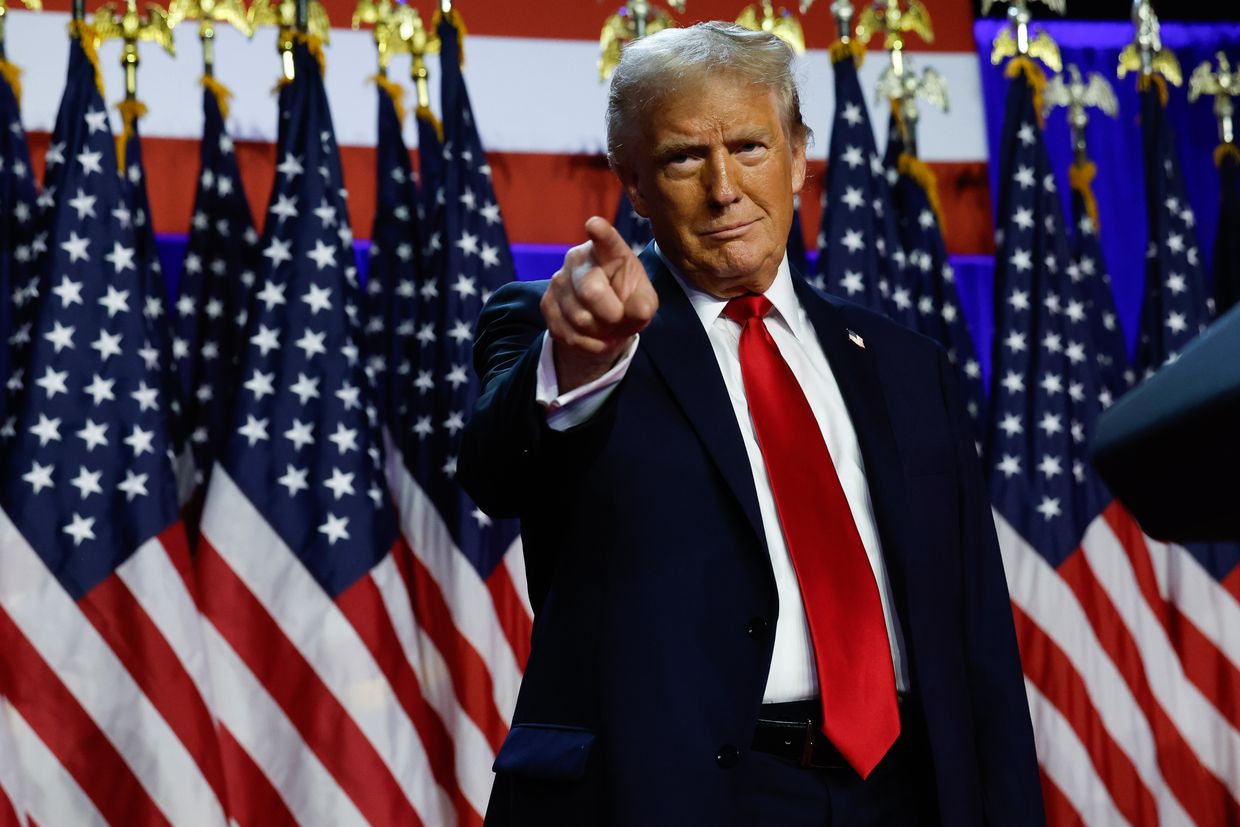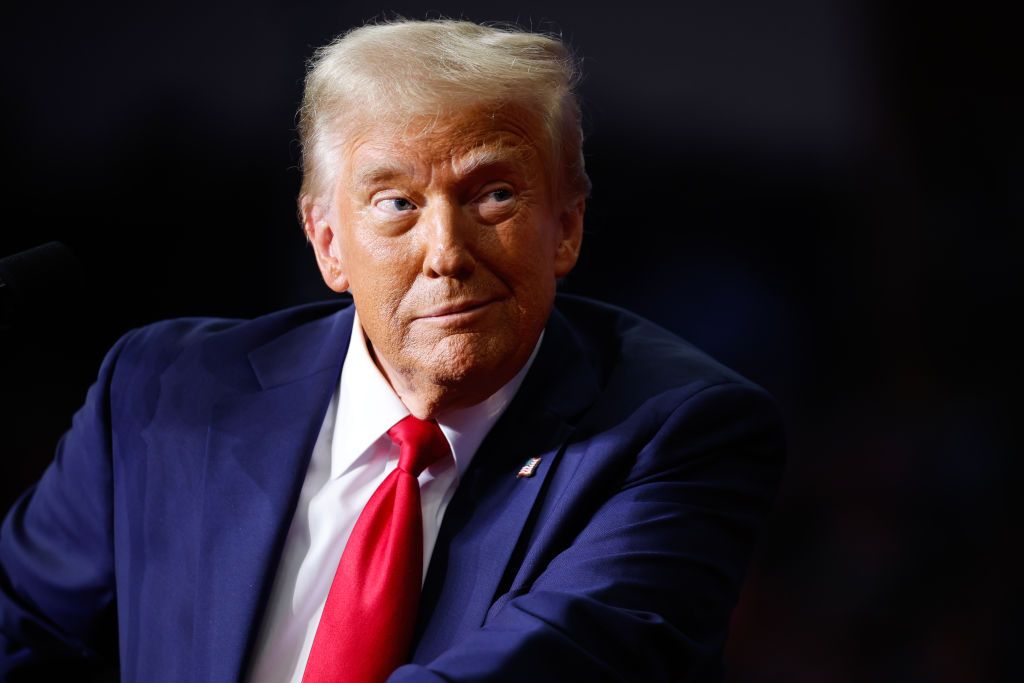Opinion: Trump holds all the cards in Ukraine’s peace gamble — will he use them?
Putin’s leverage is gone, and Trump holds all the cards — will he seal the ultimate peace deal?

U.S. President Donald Trump (L) speaks with Russian President Vladimir Putin (R) at the APC Economic Leaders' Meeting in Danang, Vietnam, on Nov. 11, 2017. (Mikhail Klimentyev/Sputnik/AFP via Getty Images)
It’s extraordinary how the fortunes of U.S. President-elect Donald Trump and Russian President Vladimir Putin have changed since they last met in 2019.
Back then, at the G20 summit in Canada, Trump was embroiled in domestic legal issues, the Mueller report, and accusations of being Moscow’s candidate. This image wasn’t helped by the disastrous summit with Putin in Helsinki the previous year.
The concern was that Putin had compromising material on Trump — like the infamous “pee tape” — which could explain Trump’s fawning overtures toward the Russian leader. Trump seemed genuinely enamored with Putin, perhaps drawn to his aura of power and menace — traits Trump may secretly aspire to himself.
At the time, Putin had ruled Russia for two decades, rebuilding its image as a great power and bolstering its military might. Russia had successfully put the West on the back foot in various international settings, from Syria to Libya and Africa, through the actions of the Wagner Group.
In Ukraine, Putin had illegally annexed Crimea and militarily intervened in Donbas, continuing his efforts to destabilize the country. His interventions in Syria, Africa, and Belarus aimed to push migrants into Europe, destabilizing the European political, economic, and social fabric, while promoting far-right and far-left movements across the continent. He backed Brexit and supported far-right and far-left candidates in Western democracies, seemingly to great effect.
Meanwhile, Putin had Europe dependent on Russian energy, using that leverage to tighten his grip through pipelines like Nord Stream and restrict other gas supply routes. Geopolitically, Putin appeared to pull all the strings, with the added backing of Chinese President Xi Jinping, solidified in their “no-limits” partnership just weeks before Russia's fateful full-scale invasion of Ukraine in February 2022.
Putin and his authoritarian allies seemed ascendant, while Western liberal democracy appeared to be on the decline. Fast forward five years, and Trump is basking in the glow of a landslide U.S. election victory. Trump now controls the Supreme Court, the judiciary, and all levers of federal power. Legal cases against him are likely to be dropped, and a recent Supreme Court ruling seems to suggest that the president is above the law. His political capital is enormous, with world leaders lining up to kiss the ring.
"Putin and his authoritarian allies seemed ascendant, while Western liberal democracy appeared to be on the decline."
Even if Putin had kompromat on him, so what? Trump has proven he can weather scandals — he once boasted he could shoot someone on Fifth Avenue with no legal consequences. With his Teflon-like ability to survive the biggest controversies, Trump can call Putin’s bluff on whatever compromising material he may have.
Contrast this with Putin, whose invasion of Ukraine has become a catastrophe for Russia. Nearly three years into the full-scale invasion, Russia — a supposed great power — has failed to defeat Ukraine, which was considered a third- or fourth-rate military power at the war's outset.
A war that was supposed to last two weeks has dragged on for over 1,000 days, with no end in sight. Russia has lost perhaps half a million soldiers and much of its conventional military strength, so much so that it’s now forced to use World War II-era equipment.
Ukraine, despite having no navy, has managed to defeat Russia’s Black Sea fleet, forcing it to flee Crimea’s Sevastopol naval base and significantly limiting its ability to operate in the Black Sea. Russia fought to secure a land corridor to Crimea, but now even the peninsula seems unsustainable, with each new land corridor turning into a white elephant.
Russia’s military technology has been exposed as inferior, with NATO’s second- and third-generation equipment outmatching Russia’s fourth- and fifth-generation hardware. Russian defense sales have plummeted, and its geopolitical leverage has evaporated. Who wants to buy Russian S-400s now, when U.S. Patriots are in high demand?
The Russian economy is buckling under sanctions, with inflation rampant, the ruble nearing record lows, and the central bank forced to raise interest rates to 21%. Russia has lost access to $330 billion in central bank reserves, with nearly $400 billion in assets immobilized abroad. The cost of the conflict to Russia is already close to $1 trillion — half of one year’s GDP.
Russia has lost the European energy market permanently, as Europe accelerates its transition away from Russian carbon energy and diversifies to suppliers like Algeria, Central Asia, and the Gulf. This was a 50-billion-euros annual business for Russia just for gas, and it’s never coming back.
Meanwhile, the “no-limits” partnership with China has exposed Russia as the junior partner. China has not offered unlimited support to Russia, instead carefully balancing its stance to avoid antagonizing the West. As a result, Russia has resorted to begging North Korea and Iran for weapons and troops.
Russia's situation has become so dire that, just a year ago, Putin faced an existential threat from a coup led by Wagner Group chief Yevgeny Prigozhin, coming dangerously close to losing power. Russia has been revealed as a declining colonial power — the entire world knows it; only Russia has yet to face the truth.
Putin enters any talks with Trump in a critically weak position. Yes, he can continue the war, as can Ukraine, but it will cost countless more Russian lives and resources, while risking another coup attempt.
Trump, on the other hand, enters potential talks from a position of overwhelming strength. He needs a Ukraine peace deal far less than Putin does. If Trump fails to reach an agreement, what are the consequences for the U.S.? Not much.
Ukraine has shown its willingness to fight, and even if the U.S. cuts its financing, Europe will continue to support Ukraine, as it has the most to lose from Russia’s aggression. And if funding is tight, Europe can tap into the $330 billion in frozen Russian assets. Ukraine and Europe will continue to order vast amounts of U.S. defense equipment, ensuring U.S. jobs and billions in contracts. Putin has no leverage over Trump now, and Trump should play hardball.
Trump is presented with a rare opportunity to broker the greatest peace deal ever. Why wouldn’t he use all his leverage to extract maximum concessions from Putin? What does Putin bring to the table? What concessions can he offer Trump?
"Trump is presented with a rare opportunity to broker the greatest peace deal ever. Why wouldn’t he use all his leverage to extract maximum concessions from Putin?"
Let’s consider the deal suggested by Vice President-elect J.D. Vance: Putin keeps all the territory in Ukraine, Ukraine remains neutral and does not join NATO, and the only concession to Ukraine is the ability to buy Western weapons to defend itself. But what is Putin offering in exchange? Nothing.
The West’s leverage is significant — sanctions could be eased if Russia withdraws to its February 2022 borders, or even better, to its 1991 borders. Russia would be reintegrated into the international community and begin rebuilding trust.
But Ukraine must be given the means to defend itself — either through NATO membership, security guarantees, or the full range of Western military technology. If NATO is unwilling to bring Ukraine in, it must still have the tools to defend itself—like Israel or South Korea. The key for Ukraine is ensuring security, financial stability, and a credible path to EU membership to anchor necessary reforms.
Trump is undeniably a fortunate politician, and this set of circumstances presents him with the opportunity to make the deal of the century on Ukraine.
Trump must be prepared to walk away. The advantage he has is that Ukraine is willing to continue fighting, and the consequences for the U.S. are minimal — but they could be existential for Putin. Trump can intensify Putin's pain by offering to supply Ukraine with the full range of U.S. conventional military equipment if Putin refuses to sign a peace deal that secures Ukraine’s future. More U.S. arms will make the situation worse for Russia on the battlefield.
Does Trump really have the Art of the Deal, or is he just Putin’s tool? We will soon find out. Putin is weak, and Trump holds all the cards. Let’s see if he can play his hand and clean up the table.
Editor’s Note: The opinions expressed in the op-ed section are those of the authors and do not necessarily reflect the views of the Kyiv Independent.












